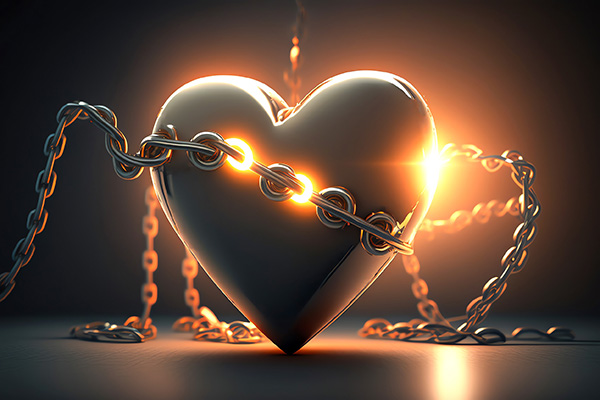emotional healing
Feeding The ‘Good Wolf’ Changes Everything!
 Since childhood, I have been fascinated by parables, folk tales and fables. I realized at a young age that there is something truly inspiring about a story that not only entertains, but carries a deeper message or spiritual lesson and speaks directly to the heart.
Since childhood, I have been fascinated by parables, folk tales and fables. I realized at a young age that there is something truly inspiring about a story that not only entertains, but carries a deeper message or spiritual lesson and speaks directly to the heart.
This love of meaningful stories hasn’t diminished over time. I still find myself drawn to stories that offer wisdom, healing, and perspective.
A few years ago, I came across a beautiful Cherokee story — one that spoke volumes to me and offers guidance to many of us as we navigate the emotional terrain of modern life.
The story goes that a young Cherokee boy found himself in a dispute with a friend. The boy felt that his friend had treated him unfairly. Hurt, and burning with anger, he stormed off to find his grandfather, a revered elder of their tribe who was known for his wisdom.
Sitting with his wise grandfather, the boy poured out his frustration, sharing the injustice he felt and the fire of anger that burned within him.
The old man listened patiently, his eyes pensve and kind. Then, with a nod, he spoke:
“I too have felt great anger at those who have taken from me what was not theirs or who have treated me unjustly. But anger wears on the soul like fire on dry grass. It consumes you if you are not careful.”
He paused, then continued, “You see, it is as if two wolves are fighting within me. One is full of anger, envy, sorrow, regret, greed, arrogance, self-pity, guilt, resentment, lies, false pride, superiority, and ego. This is the evil wolf. He lashes out, trusts no one, and isolates himself from the world.”
The Divine Path Back To Unconditional Love
 Recently, I was meditating on a deeply personal situation — one that stirred up waves of anger and resentment, even bordering on hatred and bitterness. Then I received an insight from spirit that stopped me in my tracks. It was one of those profound moments when time stands still and sacred truth illuminates your heart.
Recently, I was meditating on a deeply personal situation — one that stirred up waves of anger and resentment, even bordering on hatred and bitterness. Then I received an insight from spirit that stopped me in my tracks. It was one of those profound moments when time stands still and sacred truth illuminates your heart.
“Never forget the Golden Rule,” spirit said. “Do unto others as you would have them do unto you. Do not do to others what you do not want done to you. Do unto others as you would have them do unto you.”
Suddenly I realized that the deeper truth of holding unconditional love in your heart. It’s a universal spiritual principle because it works both ways! You would never, ever want the same hatred or anger that you direct at others, to be directed at you.
Now let me be honest. My anger this time wasn’t just outward to others. It also turned inward. It was a growing dark, toxic presence in my heart and mind.
Life has been hard lately. Too many people I know have died far too young. Watching my beloved partner in a so-called “medical facility” that should not be allowed to take care of anyone, especially our elders. Almost losing him. Being emotionally and financially drained by someone I trusted. The exhausting noise of political chaos.
It has been one thing after another, piling up until I reached a boiling point. I began to ask the big, painful question: Why? Why all this suffering? Why now? Why me? And I wasn’t just angry at the world — I was angry at myself. Angry at Source, Spirit, God. Angry at the seeming cruelty of it all.
Balance Your Mind With Crystal Energy
 The human brain is a dual force, with the left and right hemispheres complementing each other to create a balanced mind.
The human brain is a dual force, with the left and right hemispheres complementing each other to create a balanced mind.
Each side of the brain brings its own gifts to the whole, working together to shape our unique perceptions and experiences.
The left brain is known for its logical, structured, and analytical approach to processing information, excelling in tasks like reasoning, mathematics, and language.
In contrast, the right brain is more intuitive, imaginative, and emotionally expressive, fueling creativity, visual thinking, and spiritual insight.
This division of cognitive function influences how we think, solve problems, and interact with the world, both internally and externally.
In the realm of energy work and healing, various crystals and stones support and enhance the natural strengths of each brain hemisphere, promoting overall mental and emotional harmony and balance.
Whether you are seeking increased focus for problem solving or a boost in artistic expression, the right combination of crystals can support a harmonious mind that fosters both intellectual and creative growth.
By setting clear intentions and using the appropriate crystals and stones regularly, you can harness their energies to align both hemispheres of the brain and promote an integrated approach to life.
In this sacred balance, the mind and soul find unity, creating a deeper sense of wholeness and fulfillment—a fusion of logic and intuition, structure and flow, thought and feeling.
Cutting The Toxic Cords That Bind Us
 In every relationship – romantic, platonic, professional – there is a metaphysical cord of attachment that exhanges energy from one person to the other.
In every relationship – romantic, platonic, professional – there is a metaphysical cord of attachment that exhanges energy from one person to the other.
These energy cords can be thought of as WiFi signals, electrical circuits, or even surgical tubes that transfer mental, emotional, and spiritual energies between individuals. They are the invisible ties of love that keep us connected to our loved ones.
I remember reading an article years ago about the intense grief of famous American singer Dean Martin after the tragic death of his eldest son. His boy was a fighter pilot in the California Air National Guard and lost his life in a plane crash during a training flight in 1987.
Martin described the loss as feeling as if his “heart had been ripped out.” This vivid description is a testament to the reality of these ties that bind us. The intense pain the singer felt was essentially his heart chakra feeling ‘broken.’ The loss had a profound impact on the remainder of his life and career.
The concept of these cords may seem abstract, but their effects are very tangible. They are not just symbolic; they are very real and have a profound effect on our physical, emotional, mental, and spiritual well-being on a daily basis.
When we engage in any kind of relationship with someone, these energetic cords extend from our chakras, or energy centers, to those of the other person. While these soul-to-soul cords feed us with all the good energies that come from being connected to others, such as love, nurturing, and belonging, they can also have the opposite effect.
Coping With The Loss Of A Loved One
 The loss of a loved one is one of the most profound and challenging experiences we can have. Even if we have a deep spiritual belief that our loved one has crossed over into the spirit realm free of pain and suffering, the grief of their physical absence remains.
The loss of a loved one is one of the most profound and challenging experiences we can have. Even if we have a deep spiritual belief that our loved one has crossed over into the spirit realm free of pain and suffering, the grief of their physical absence remains.
It is natural to mourn their departure, to feel the sting of their absence in our daily lives, and to struggle with the reality of a world that feels less complete without them.
For those who have lost a parent, this grief can bring an added layer of vulnerability. Regardless of our age, the loss of a mother or father can leave us feeling untethered, with a foundation in life that once provided security and guidance now shaken. Even if we have spent years caring for them through illness or decline, their passing can still leave us feeling profoundly alone.
This transition marks a significant shift, not only in our outer reality, but also in our inner identity. And yet, in the depths of grief, there is an opportunity for deep reflection, gratitude, and connection.
One of the most powerful ways to navigate grief is to focus on gratitude for the connection you shared with your loved one. Their love, wisdom, and presence shaped you in countless ways, and that influence does not disappear with their passing. Celebrate their life with vigor. Share their stories, embrace cherished memories, and allow their laughter to echo through your heart.
The Healing Power Of The Ocean
 Just as we clean material objects to maintain their quality and longevity, our mind, body, and spirit also require regular cleansing to ensure optimal functioning. Environmental stressors, emotional upheaval, and the demands of daily life can accumulate as energetic debris that weighs us down physically, mentally, and spiritually.
Just as we clean material objects to maintain their quality and longevity, our mind, body, and spirit also require regular cleansing to ensure optimal functioning. Environmental stressors, emotional upheaval, and the demands of daily life can accumulate as energetic debris that weighs us down physically, mentally, and spiritually.
Our energetic field absorbs influences from people, places, and experiences. Over time, unresolved emotions, stress, and negativity can cloud our vitality, leading to fatigue, irritability, and disconnection from our inner selves.
Just as we clean our homes or our physical bodies, it’s important to clean our energy field. Neglecting to do so can affect our long-term well-being, leaving us feeling drained and spiritually stagnant.
One of the most profound ways to restore balance and revitalize our energy is through ocean healing – a timeless practice known to humankind since ancient times.
The ocean has long been revered as a sacred space for cleansing and rejuvenation. Its rhythmic waves, expansive horizon, and vast depths symbolize release, renewal, and infinite possibilities.
Simply spending time by the ocean can have a profound effect on our nervous system, calming the mind and grounding the emotions. The soothing sounds of the waves, the cool breeze, and the connection to the Earth’s vast waters stimulate relaxation and promote a meditative state, making it easier to release tension and embrace inner peace.
A Cord Cutting Ritual To Let Go And Move On
 Heartbreak can be one of the most difficult emotional hurdles we face.
Heartbreak can be one of the most difficult emotional hurdles we face.
Whether you’re recovering from a failed romantic relationship, a friendship that has run its course, going no contact with a toxic family member, or any significant emotional connection that has ended, finding closure and healing is essential to moving forward.
Unresolved emotions and lingering energetic attachments can weigh heavily on your heart, making it difficult to embrace new opportunities and experiences.
A powerful way to release these lingering energy attachments is through a cord-cutting ritual. This practice helps cultivate self-love and emotional freedom, and opens the door to new beginnings. Unlike repressing feelings or rushing into distractions, cord cutting allows you to consciously acknowledge and release energetic attachments that no longer serve you.
Energetic cords are metaphysical connections that form between people, places, or situations. They are strengthened by intense emotions and shared experiences. While some cords nourish us with love, support, and positive energy, others can drain our vitality — especially when a relationship has ended or become unhealthy. These draining cords can lead to repetitive thoughts, emotional stagnation, or a feeling of being energetically “stuck.”
A cord cutting ritual does not erase cherished memories or sever positive emotions you may have shared with someone. Instead, it focuses on releasing unhealthy attachments that prevent emotional freedom and personal growth. By clearing these residual energies, you make room for peace, clarity, and new possibilities to flow into your life.